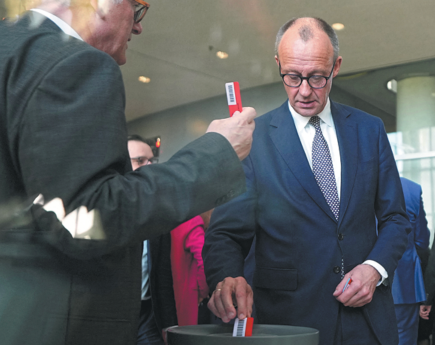German parliament OKs big increase in spending

BERLIN — Germany's parliament approved plans for a massive spending surge on Tuesday, throwing off decades of fiscal conservatism in hopes of reviving economic growth and scaling up military spending for a new era of European collective defense.
The approval in the Bundestag hands conservative leader Friedrich Merz a huge boost, giving the chancellor-in-waiting a windfall of hundreds of billions of euros to ramp up investment after two years of contraction in Europe's largest economy.
Germany and other European nations have been under pressure to shore up their defenses in the face of shifts in US policy, which European leaders fear could leave the continent exposed.
Merz's conservatives and Social Democrats, or SPD, who are in talks to form a centrist coalition after last month's election, want to create a 500 billion euro ($546 billion) fund for infrastructure and to ease constitutionally enshrined borrowing rules to allow higher spending on defense.
"We have for at least a decade felt a false sense of security," Merz told lawmakers ahead of the vote.
"The decision we are taking today on defense readiness … can be nothing less than the first major step toward a new European defense community," he said.
The legislation still has to go on Friday to the Bundesrat upper house but the main hurdle to passage there appeared to fall on Monday when the Bavarian Free Voters agreed to back the plans.
The conservatives and SPD wanted to pass the legislation through the outgoing parliament for fear it could be blocked by an enlarged contingent of far-right and far-left lawmakers in the next Bundestag starting March 25.Merz has justified the tight timetable with the rapidly changing geopolitical situation.
"In our view, this is a historic fiscal regime shift, arguably the largest since German reunification," said Robin Winkler, Chief German Economist at Deutsche Bank Research.
"It's excellent news because it sends a very clear message, very clear message also to Europe that Germany is determined to invest massively in defense," said EU Commission President Ursula von der Leyen.
NATO chief Mark Rutte wrote on X that "this sends a powerful message of leadership and commitment to our shared security".
And French President Emmanuel Macron on a visit to Berlin congratulated Chancellor Olaf Scholz "on the historic vote of the Bundestag which is good news for Germany and good news for Europe".
The reforms mark a major rollback of the so-called debt brake imposed after the 2008 global financial crisis but have been criticized by many as outdated and putting Germany into a fiscal straitjacket.
Shift in policy
But critics, including within his own party, accuse Merz of "voter fraud" for promising spending restraint during the election campaign only to announce the shift in fiscal policy just days after winning.
"The politician's greatest asset is credibility," said Tino Chrupalla, co-leader of the far-right Alternative for Germany, or AfD, during the debate.
"With these embarrassing actions, Mr Merz, you have already completely squandered yours. The voters feel betrayed by you, and rightly so."
Before the vote, Bernd Baumann of the AfD accused Merz of ignoring the will of voters by seeking to push the vote through the outgoing parliament.
Lars Klingbeil of the SPD said that the new spending aimed to "maintain peace in Europe" but also "invest in advancing the economy and strengthening social cohesion" and therefore help counter "division and polarization".
Economists caution that further reforms are needed, for example, to cut bureaucracy, to ensure sustainable growth.
Fitch Ratings agency also warned on Tuesday that Germany's coveted AAA rating could come under pressure in the longer run if its vast spending effort is not offset by consolidation measures, or fails to produce a lasting improvement in economic growth.
Agencies via Xinhua






















